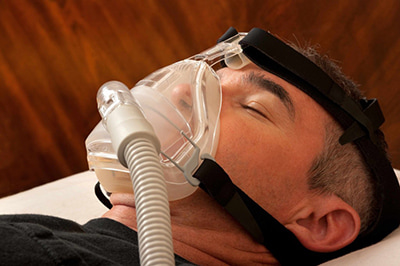Recent Posts
Do I have sleep apnea?

Sleep apnea is a serious condition in which you repeatedly stop breathing or have shallow breaths while you sleep. When this happens, you may snore loudly or making choking noises as you try to breathe. Your brain and body become oxygen-deprived, and you may wake up. This may happen a few times a night, or in more severe cases, hundreds of times during the night.
More than 18 million American adults have sleep apnea, and many cases are undiagnosed.
Main types of sleep apnea
Obstructive sleep apnea
This is the more common form, which occurs when throat muscles relax. When the muscles relax, your airway narrows or closes as you breathe in, and you can't get an adequate breath. This may lower the level of oxygen in your blood.
Your brain senses this inability to breathe and briefly awakens you from sleep so that you can reopen your airway. This awakening is usually so brief that you don't remember it.
You may make a snorting, choking or gasping sound. This pattern can repeat itself five to 30 times or more each hour, all night long. These disruptions impair your ability to reach the desired deep, restful phases of sleep, and you'll probably feel sleepy during your waking hours.
Central sleep apnea
This form is much less common than obstructive sleep apnea and occurs when your brain doesn't send proper signals to the muscles that control breathing. This means you make no effort to breathe for a short period of time. You may awaken with shortness of breath or have a difficult time getting to sleep or staying asleep.
Complex sleep apnea syndrome
Also known as treatment-emergent central sleep apnea, complex sleep apnea syndrome occurs when someone has both obstructive sleep apnea and central sleep apnea.
Sleep apnea signs and symptoms
The most common signs and symptoms of obstructive and central sleep apneas include:
- Loud snoring, which is usually more prominent in obstructive sleep apnea
- Episodes of breathing cessation during sleep witnessed by another person
- Abrupt awakenings accompanied by shortness of breath, which more likely indicates central sleep apnea
- Awakening with a dry mouth or sore throat
- Morning headache
- Difficulty staying asleep (insomnia)
- Excessive daytime sleepiness (hypersomnia)
- Attention problems
- Irritability
Sleep apnea risk factors
Risk factors for obstructive sleep apnea include:
- Excess weight
- Increased Neck circumference
- A narrowed airway
- Being male
- Being older
- Family history
- Use of alcohol, sedatives or tranquilizers
- Smoking
- Nasal congestion
Risk factors for central sleep apnea include:
- Being older
- Heart disorders
- Using narcotic pain medications
- Stroke
Untreated sleep apnea can:
- Increase the risk of high blood pressure, heart attack, stroke, obesity and diabetes
- Increase the risk of developing, or worsen heart failure
- Make arrhythmias ( irregular heartbeats) more likely
- Increase the chance of having work-related or driving accidents
- Increase the risk of complications with certain medications and surgery
Sleep studies
Sleep studies are tests that measure how well you sleep and how your body responds to sleep problems. These tests can help your doctor find out if you have a sleep disorder and how severe it is. Sleep studies are the most accurate tests for diagnosing sleep apnea.
Treatment for sleep apnea
Sleep apnea is treated with lifestyle changes, mouthpieces, breathing devices and surgery. Medicines typically aren't used to treat the condition.
The goals of treating sleep apnea are to restore regular breathing during sleep and to relieve symptoms, such as loud snoring and daytime sleepiness.
Treatment may improve other medical problems linked to sleep apnea, such as high blood pressure. Treatment also can reduce your risk for heart disease, stroke and diabetes.
For milder cases of obstructive sleep apnea, your doctor may recommend lifestyle changes, such as:
- Losing weight if you're overweight
- Exercising regularly
- Drinking alcohol moderately, if at all, and not drinking several hours before bedtime
- Using a nasal decongestant or allergy medications.
- Avoiding sleeping on your back
If these measures don't improve your sleep or if your apnea is moderate to severe, then your doctor may recommend other treatments. Certain devices can help open up a blocked airway. In other cases, surgery may be necessary.
By Mayo Clinic Health System staff





